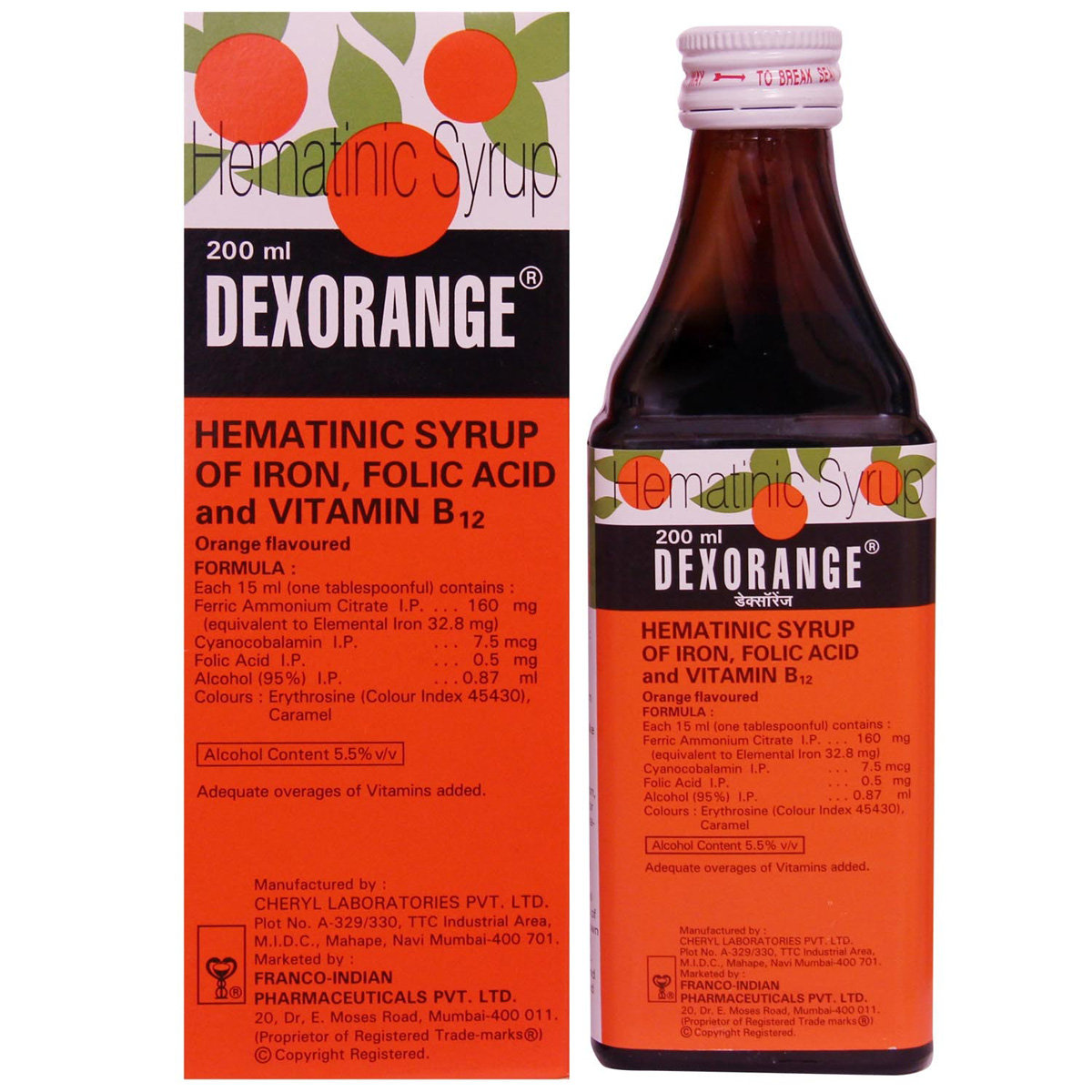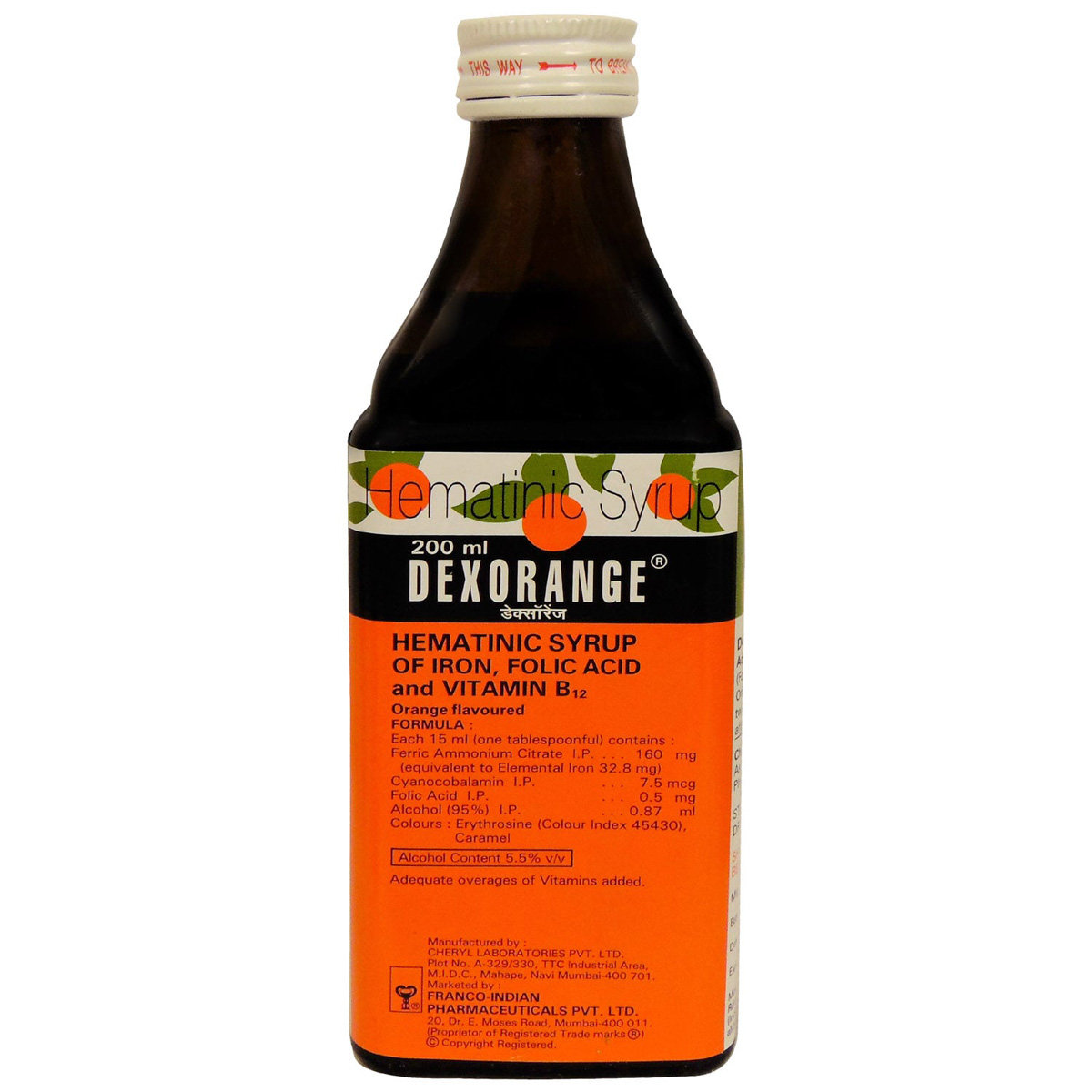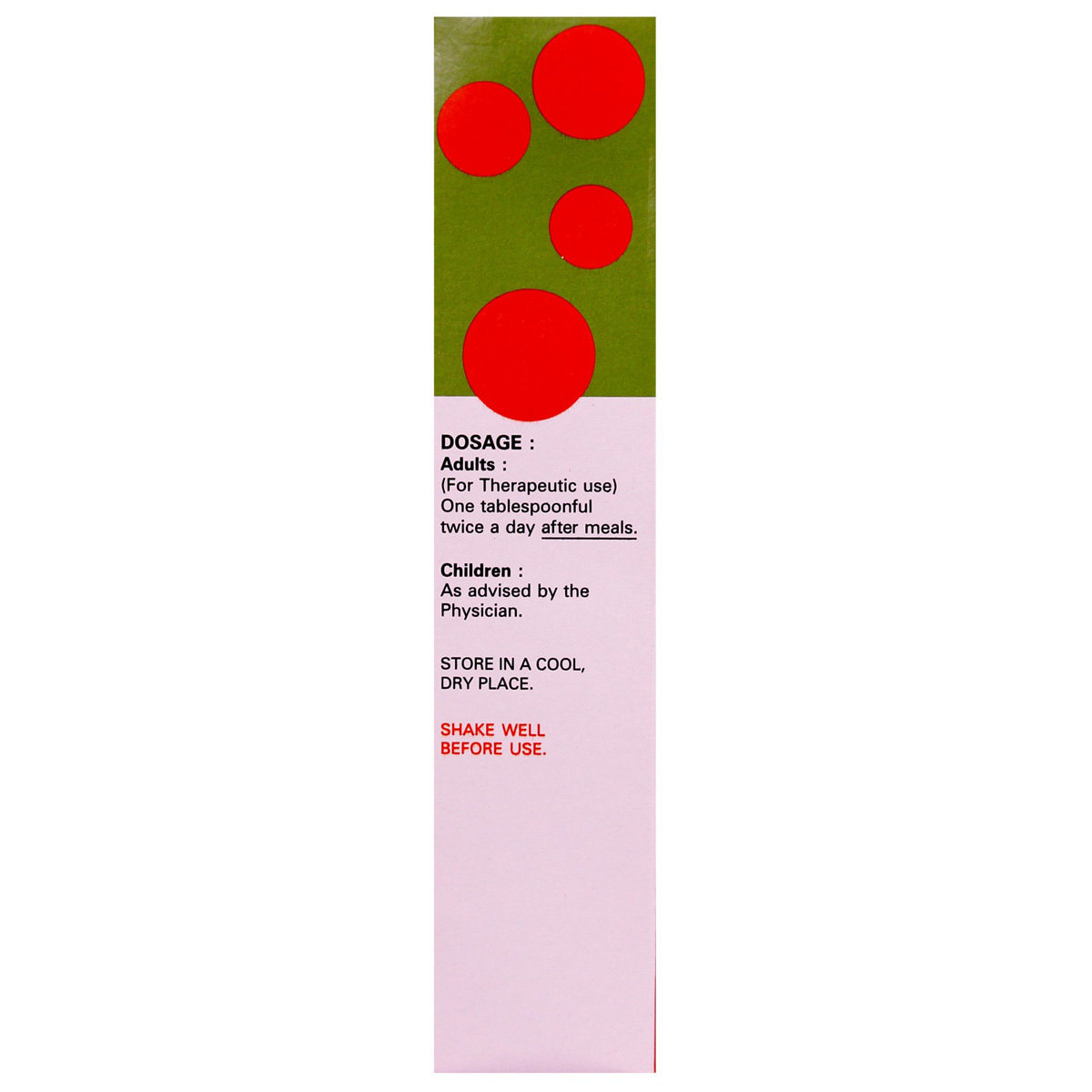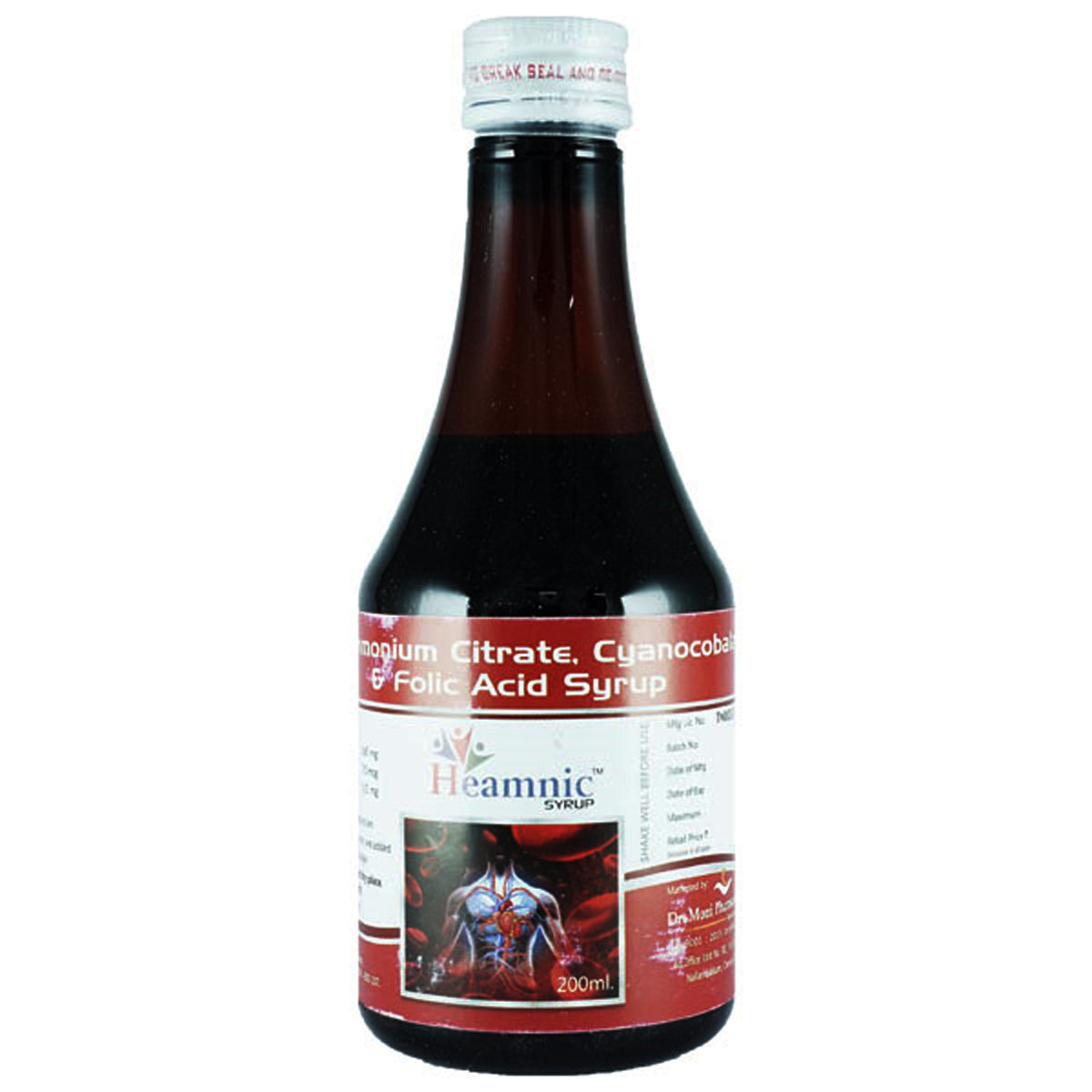Dexorange Syrup 200 ml
MRP ₹197.5
(Inclusive of all Taxes)
₹29.6 Cashback (15%)
About Dexorange Syrup
Dexorange Syrup belongs to the group of medicines called nutritional supplements used to treat and prevent nutritional deficiencies such as iron deficiency, anaemia, and folic acid deficiency. A nutritional deficiency occurs when the body does not absorb or get enough nutrients from food. Vitamins and minerals are necessary for body development and the prevention of diseases.
Dexorange Syrup contains Cyanocobalamin, Ferric ammonium citrate, and Folic acid. Cyanocobalamin is essential for growth, cell production, protein and tissue synthesis. Ferric ammonium citrate acts as a source of iron which helps in the transportation of oxygen throughout the body and the production of red blood cells. Folic acid is necessary for various bodily functions, such as the production of red blood cells, growth, and development. Together, Dexorange Syrup helps in treating nutritional deficiencies.
You are advised to take Dexorange Syrup for as long as your doctor has recommended it for you, depending on your medical condition. In some cases, you may experience certain common side-effects such as stomach upset, constipation, diarrhoea, nausea, and vomiting. Most of these side effects do not require medical attention and will resolve gradually over time. However, you are advised to talk to your doctor if you experience these side effects persistently.
Let your doctor know if you are taking any other medicines or herbal products before starting Dexorange Syrup . If you are known to be allergic to any of the components in Dexorange Syrup , please inform your doctor. Consult your doctor before taking Dexorange Syrup if you are pregnant or breastfeeding. Dexorange Syrup should not be given to children unless advised by a doctor. It is unknown if alcohol interacts with Dexorange Syrup , so please consult a doctor.
Country of origin
Manufacturer/Marketer address
Online payment accepted

secured payment

india's most trusted pharmacy

genuine products
Manufacturer/Marketer :
Consume Type :
Expires on or after :
Return Policy :
Provide Delivery Location
About Dexorange Syrup
Dexorange Syrup belongs to the group of medicines called nutritional supplements used to treat and prevent nutritional deficiencies such as iron deficiency, anaemia, and folic acid deficiency. A nutritional deficiency occurs when the body does not absorb or get enough nutrients from food. Vitamins and minerals are necessary for body development and the prevention of diseases.
Dexorange Syrup contains Cyanocobalamin, Ferric ammonium citrate, and Folic acid. Cyanocobalamin is essential for growth, cell production, protein and tissue synthesis. Ferric ammonium citrate acts as a source of iron which helps in the transportation of oxygen throughout the body and the production of red blood cells. Folic acid is necessary for various bodily functions, such as the production of red blood cells, growth, and development. Together, Dexorange Syrup helps in treating nutritional deficiencies.
You are advised to take Dexorange Syrup for as long as your doctor has recommended it for you, depending on your medical condition. In some cases, you may experience certain common side-effects such as stomach upset, constipation, diarrhoea, nausea, and vomiting. Most of these side effects do not require medical attention and will resolve gradually over time. However, you are advised to talk to your doctor if you experience these side effects persistently.
Let your doctor know if you are taking any other medicines or herbal products before starting Dexorange Syrup . If you are known to be allergic to any of the components in Dexorange Syrup , please inform your doctor. Consult your doctor before taking Dexorange Syrup if you are pregnant or breastfeeding. Dexorange Syrup should not be given to children unless advised by a doctor. It is unknown if alcohol interacts with Dexorange Syrup , so please consult a doctor.
Uses of Dexorange Syrup
Key Benefits
Dexorange Syrup is a combination of three supplements, namely: Cyanocobalamin, Ferric ammonium citrate, and Folic acid. Dexorange Syrup is used to treat and prevent nutritional deficiencies. Cyanocobalamin helps in the proper functioning of the brain, nerves and the production of red blood cells. Ferric ammonium citrate acts as a source of iron which helps in the transportation of oxygen throughout the body and the production of red blood cells. Folic acid is necessary for various bodily functions, such as nucleotide biosynthesis and remethylation of homocysteine. Together, Dexorange Syrup helps in treating nutritional deficiencies.
Directions for Use
Storage
Side Effects of Dexorange Syrup
- Stomach upset
- Constipation
- Diarrhoea
- Nausea
- Vomiting
Drug Warnings
Do not take Dexorange Syrup if you are allergic to any of its components. Inform your doctor if you have a blood disorder, stomach ulcers, folate dependant tumour, iron overload syndrome, stomach bleeding, stomach/intestinal disorder, diabetes, heart, kidney, liver problems or if you receive blood transfusions. Consult a doctor if you are pregnant or breastfeeding. Dexorange Syrup should be given to children only if advised by the doctor. Let your doctor know if you are using any other medicines, or herbal products before starting Dexorange Syrup .
Drug Interactions
Drug-Drug Interactions: Dexorange Syrup may interact with an antibacterial agent (nitrofurantoin), anticancer drug (methotrexate), antiparasitic (pyrimethamine), anticonvulsants (phenobarbital, phenytoin, primidone).
Drug-Food Interactions: Avoid consuming milk, milk products, tea, coffee, meat, and whole grains simultaneously as taking Dexorange Syrup , as they might affect the absorption of Dexorange Syrup .
Drug-Disease Interactions: Inform your doctor if you have a blood disorder or stomach ulcer.
Drug-Drug Interactions Checker List
- NITROFURANTOIN
- METHOTREXATE
- PYRIMETHAMINE
- PHENOBARBITAL
- PHENYTOIN
- PRIMIDONE
Habit Forming
Diet & Lifestyle Advise
- Follow a well-balanced diet.
- Exercising regularly helps in improving overall health.
- Rest well, get plenty of sleep.
- Avoid smoking and alcohol consumption.
- Meditation and yoga can help lower stress.
- Avoid processed and fried food.
Disease/Condition Glossary
Nutritional deficiencies: A nutritional deficiency occurs when the body does not absorb or get enough nutrients from food. Vitamins and minerals are necessary for body development and the prevention of diseases. Sometimes your body is unable to absorb many nutrients even if you are consuming them. Nutrient deficiency can lead to many health problems like a weakened immune system, skin problems, digestion problems, defective bone growth, and neurological diseases.
FAQs
Disclaimer
Alcohol
Safe if prescribed
It is unknown if alcohol interacts with Dexorange Syrup , so please consult a doctor.
Pregnancy
Consult your doctor
Please consult your doctor if you are pregnant or if you have any concerns regarding this; your doctor will recommend only if the benefits outweigh the risks.
Breast Feeding
Consult your doctor
Consult your doctor if you are breastfeeding; your doctor will decide whether Dexorange Syrup can be taken by breastfeeding mothers or not.
Driving
Safe if prescribed
It is unknown whether Dexorange Syrup affects your ability to drive. Drive or operate machinery only if you are alert.
Liver
Consult your doctor
Limited data is available regarding the usage of Dexorange Syrup in patients with liver impairment. Please consult your doctor.
Kidney
Consult your doctor
Limited data is available regarding the usage of Dexorange Syrup in patients with kidney impairment. Please consult your doctor.
Children
Safe if prescribed
Dexorange Syrup should be given to children only if advised by the doctor.
Author Details
We provide you with authentic, trustworthy and relevant information
Uses of Dexorange Syrup
Key Benefits
Dexorange Syrup is a combination of three supplements, namely: Cyanocobalamin, Ferric ammonium citrate, and Folic acid. Dexorange Syrup is used to treat and prevent nutritional deficiencies. Cyanocobalamin helps in the proper functioning of the brain, nerves and the production of red blood cells. Ferric ammonium citrate acts as a source of iron which helps in the transportation of oxygen throughout the body and the production of red blood cells. Folic acid is necessary for various bodily functions, such as nucleotide biosynthesis and remethylation of homocysteine. Together, Dexorange Syrup helps in treating nutritional deficiencies.
- Drink water or other clear fluids.
- To prevent worsening of pain, limit intake of tea, coffee, or alcohol.
- Include bland foods like rice, toast, crackers, and rice in your diet.
- Avoid lying down immediately after eating as it may cause indigestion or heartburn.
- Avoid acidic and spicy food as it may cause indigestion.
- Inform your doctor about the nausea and discuss possible alternatives to the medication or adjustments to the dosage.
- Divide your daily food intake into smaller, more frequent meals to reduce nausea.
- Opt for bland, easily digestible foods like crackers, toast, plain rice, bananas, and applesauce.
- Avoid certain foods that can trigger nausea, such as fatty, greasy, spicy, and smelly foods.
- Drink plenty of fluids, such as water, clear broth, or electrolyte-rich beverages like coconut water or sports drinks.
- Use ginger (tea, ale, or candies) to help relieve nausea.
- Get adequate rest and also avoid strenuous activities that can worsen nausea.
- Talk to your doctor about taking anti-nausea medication if your nausea is severe.
- Record when your nausea occurs, what triggers it, and what provides relief to help you identify patterns and manage your symptoms more effectively.
- Tell your doctor about your GAS symptoms. They may change your medication regimen or prescribe additional drugs to help you manage them.
- To manage GAS symptoms, eat a balanced diet of fibre, vegetables, and fruits.
- Drink enough water throughout the day to avoid constipation and treat GAS symptoms.
- Regular exercise like yoga and walking may help stimulate digestion and alleviate GAS symptoms.
- Take probiotics only if your doctor advises, as they may help alleviate GAS symptoms by promoting gut health.
- Take medication for GAS symptoms only if your doctor advises, as certain medications can interact with your existing prescriptions or worsen symptoms.
- If symptoms persist, worsen, or are accompanied by severe abdominal pain, vomiting, or bleeding, seek immediate medical attention.
Directions for Use
Storage
Drug Warnings
Do not take Dexorange Syrup if you are allergic to any of its components. Inform your doctor if you have a blood disorder, stomach ulcers, folate dependant tumour, iron overload syndrome, stomach bleeding, stomach/intestinal disorder, diabetes, heart, kidney, liver problems or if you receive blood transfusions. Consult a doctor if you are pregnant or breastfeeding. Dexorange Syrup should be given to children only if advised by the doctor. Let your doctor know if you are using any other medicines, or herbal products before starting Dexorange Syrup .
Therapeutic Class
Drug-Drug Interactions
Drug-Drug Interactions
Login/Sign Up
Coadministration of Dexorange Syrup 200 ml and Cholestyramine may interfere with the absorption of Dexorange Syrup 200 ml.
How to manage the interaction:
Although taking Cholestyramine and Dexorange Syrup 200 ml together can result in an interaction, they can be taken together if prescribed by a doctor. However, if you experience Constipation, Diarrhea, Stomach pain, Nausea, or Loss of appetite, consult a doctor. Do not stop using any medications without consulting a doctor.
Sulfadiazine may decrease the blood levels and effects of Dexorange Syrup 200 ml.
How to manage the interaction:
Although there is a possible interaction between Dexorange Syrup 200 ml and Sulfadiazine, you can take these medicines together if prescribed by your doctor.
Co-administration of Dexorange Syrup 200 ml with Capecitabine may increase the risk of serious side effects such as bleeding problems, anemia, infections, and nerve damage.
How to manage the interaction:
Although there is a possible interaction between Dexorange Syrup 200 ml and Capecitabine, you can use these medicines together if prescribed by the doctor. However, if you experience paleness of skin, diarrhea, severe nausea and vomiting, over-tiredness, dizziness, fainting, blood in the stools, unusual bleeding or bruising, fever, chills, body aches, flu-like symptoms, skin reactions, mouth ulcers or sores, and/or numbness, burning or tingling sensation in the hands and feet, contact a doctor. Do not discontinue the medication without consulting a doctor. Do not discontinue the medication without consulting a doctor.
Coadministration of Dexorange Syrup 200 ml and Carbamazepine may reduce the blood levels of Dexorange Syrup 200 ml.
How to manage the interaction:
Although there is a possible interaction between Dexorange Syrup 200 ml and Carbamazepine, you can take these medicines together if prescribed by your doctor. However, if your condition changes or you experience loss of seizure control, contact your doctor.
Coadministration of Dexorange Syrup 200 ml and Fluorouracil may increase the effects of Fluorouracil and increase the risk of serious side effects such as bleeding problems, anaemia (lack of blood), infections, and nerve damage.
How to manage the interaction:
Although there is a possible interaction between Dexorange Syrup 200 ml and Fluorouracil, you can take these medicines together if prescribed by your doctor. However, if you experience diarrhoea, paleness of skin, severe nausea and vomiting, over-tiredness, dizziness, fainting, blood in the stools, unusual bleeding or bruising, fever, chills, body pains, flu-like symptoms, skin reactions, mouth ulcers or sores, and/or numbness, burning or tingling in your hands and feet, contact your doctor.
Trimethoprim may decrease the blood levels and effects of Dexorange Syrup 200 ml.
How to manage the interaction:
Although there is a possible interaction between Dexorange Syrup 200 ml and Trimethoprim, you can take these medicines together if prescribed by your doctor. Do not stop using any medications without consulting your doctor.
Drug-Drug Interactions Checker List
- NITROFURANTOIN
- METHOTREXATE
- PYRIMETHAMINE
- PHENOBARBITAL
- PHENYTOIN
- PRIMIDONE
Diet & Lifestyle Advise
- Follow a well-balanced diet.
- Exercising regularly helps in improving overall health.
- Rest well, get plenty of sleep.
- Avoid smoking and alcohol consumption.
- Meditation and yoga can help lower stress.
- Avoid processed and fried food.
Habit Forming
Side Effects of Dexorange Syrup
- Stomach upset
- Constipation
- Diarrhoea
- Nausea
- Vomiting
Disease/Condition Glossary
Nutritional deficiencies: A nutritional deficiency occurs when the body does not absorb or get enough nutrients from food. Vitamins and minerals are necessary for body development and the prevention of diseases. Sometimes your body is unable to absorb many nutrients even if you are consuming them. Nutrient deficiency can lead to many health problems like a weakened immune system, skin problems, digestion problems, defective bone growth, and neurological diseases.
All Substitutes & Brand Comparisons
RX
Out of StockNicofer Syrup 300 ml
Abbott India Ltd
₹64
(₹0.19/ 1ml)
78% CHEAPERRX
Heamnic Syrup 200 ml
Dr Moni Pharmaceuticals Pvt Ltd
₹132.5
(₹0.6/ 1ml)
32% CHEAPER

Have a query?





















_0.jpg?tr=q-85)



